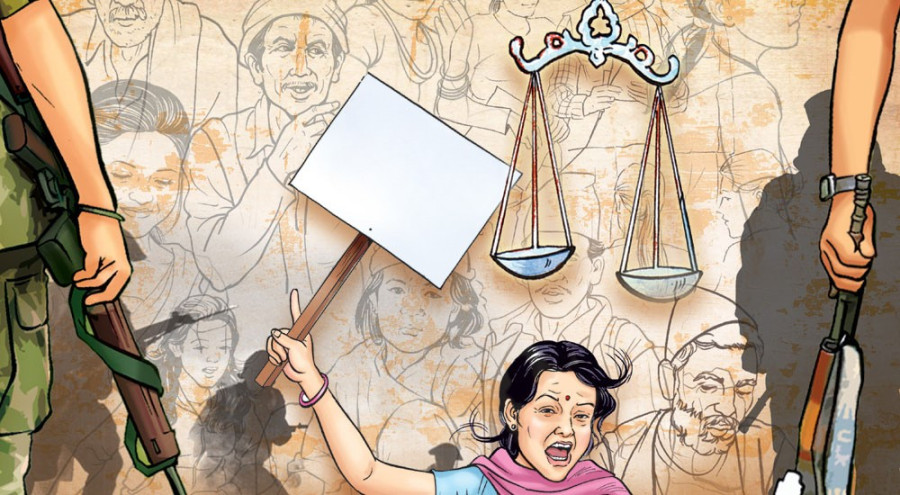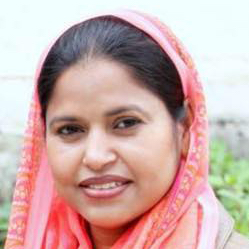Columns
Ignored voices
Even after 18 years of commitment, Nepal has failed to instil victims’ trust in the TJ process.
Mohna Ansari
The government of Nepal has once again halted the Transitional Justice (TJ) process by conducting another round of nominations of the chairpersons and members of the Truth and Reconciliation Commission (TRC) and the Commission of Investigation on Enforced Disappeared Persons (CIEDP) in a manner that lacks transparency. Victims have yet again been forced to withdraw from the TJ process and protest against the bodies to get the process properly implemented with their trust.
In November 2006, one of the important commitments of the Comprehensive Peace Accord (CPA) was to carry out the transitional justice process. This would reveal the truth about the traumatic events Nepal went through during a decade-long Maoist insurgency (1996-2006). At the time, no one was surprised by the commitment of the CPA, as hundreds of atrocities had occurred, thousands murdered, thousands more wounded and tens of thousands displaced from their homes. Cases of sexual and gender-based violence surfaced all over the country, in all sectors and nearly all institutions. Sadly, the full extent of sexual abuse during the conflict has only been recognised recently.
The government pledged to provide all available information about the missing people within 60 days of signing the accord. It all appeared quite simple then, as TJ processes had become common internationally. They aimed to resolve conflicts and strengthen peace. People seemed to have the right to know what had gone unreported during the conflict. The right to the truth was accepted. Eighteen years have passed since, yet nothing has happened.
After 10 years of war, the people of Nepal were in shock over what had happened to them and what they had seen. There was still a clear need to establish the truth and ensure justice to create the conditions for rebuilding the country.
There are many reasons why the process hasn’t progressed. At every stage, the government has ignored the victim groups and the beneficiary stakeholders. Their demands have been repeatedly ignored, and commissioners have been named without assurances that they meet the basic standards. Furthermore, the government didn’t consult the victims while nominating the office bearers. The former commissioners nominated by the Communist Party of Nepal (Unified Marxist-Leninist), the Nepali Congress and the Maoist have been incompetent, and the parties have chosen people based on party loyalty rather than qualifications or commitment to human rights. Civil society, including the media, should be alert and closely monitor the performance of the commissions once they begin their duties.
Perhaps the parties think that the victims are demanding too much. However, the victims only want the TJ commissioners to be competent and independent—basic qualities without which the TJ process cannot win public legitimacy.
The only real progress since 2006 has been the registration of just over 60,000 complaints. But none of these have been investigated or evaluated. Now, some victims are even considering withdrawing the complaints they submitted due to a lack of confidence in the TJ bodies.
In 2015, the Supreme Court had to intervene to point out that the government’s proposed TJ law violated both national and international laws, providing amnesty for serious crimes. This led some to conclude that the successive governments have spent more effort on breaking laws than implementing them, prioritising the protection of those who have committed serious crimes. Even now, we lack assurances that the government and the security forces will offer genuine cooperation to the process so that key cases like Maina Sunuwar’s (a 15-year-old girl killed by the Nepali army in 2004) can be clarified.
In August 2024, the lower house of Parliament endorsed the long-awaited Transitional Justice Bill, thereby making it a law. Despite its apparent flaws, the victims’ groups prepared themselves to move forward, as it seemed to represent a more open position from the government. But the subsequent refusal of the government to act with transparency has dashed this hope. For the law to progress, it would require not only the acceptance of the victims but also the government’s goodwill to find common ground on areas where the law is insufficient.
However, recent weeks have clearly shown that the political parties do not have such positive political will. They have shown that they will only allow the process to progress if they have complete control over the TJ bodies.
The shameful performance of the three leading parties over the past 18 years has shocked the stakeholders. Their recent joint press release, in response to the lack of transparency in creating new commissions last week, strongly evokes a sense of betrayal and deception. But the shock and concern go beyond the stakeholders. Justice has been denied to the victims, but all Nepalis suffer from the lack of reform of the judiciary and police forces, which has to be done based on our lessons from the conflict.
It is frustrating that, after all these years, the government has failed to win victims’ trust in the TJ process, particularly in the composition of the commissions. Until trust is established, any donor funding for the TJ process would be at high risk.
Setting in motion a proper transitional justice process with all its elements—truth, justice, reparations and non-recurrence—is an opportunity for the big parties to show their faith and commitment to the rule of law. I urge them to embrace the TJ process with enthusiasm to end impunity and respect the law of the land.




 9.89°C Kathmandu
9.89°C Kathmandu















